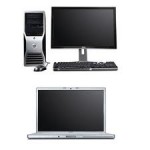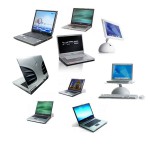HOW GOOD ARE YOUR TECHNOLOGY SKILLS?
 Looking to start a new business? Are you in the job market?
Looking to start a new business? Are you in the job market?
Chances are that if you previously worked for a company and had an assistant, many tasks were delegated and support was just a phone call away. Whether you are starting a new venture or looking for employment, your success will depend on your basic computer skills and having a technology plan that supports your efforts.
The majority of Baby Boomers did not start their professional careers in the digital world. The way we communicate and acquire information has changed dramatically. Social networks such as LinkedIn, Facebook, and Twitter are now part of our personal and business lives. Cell phones have made us more mobile and reachable everywhere. Everyone uses Google to find people, places and things.
Set some time aside and take an inventory of your basic technology skills. Are you able to retrieve and save e-mail attachments, search through past e-mails? Are you able to type and format documents? Are you able to locate your documents? Are you able to make educated decisions about your equipment? Do you know how to use a smartphone? The list is endless.
Individuals and companies that have not embraced technology will find it very difficult to compete in today’s global and wired world.
If you feel you need to brush up on your basic computer skills or want to understand more about the world of technology, do not hesitate to contact me at 917 921-4518 or by e-mail at jblue@bluetutor.com. If you are in career transition, feel free to click here to receive my free white paper on Technology Tips on setting up a home office and becoming a true road warrior.
ARE YOU AN ACTIVE LINKEDIN USER?
 LinkedIn has become the number one tool for business people looking to expand their network. Executive recruiters and employment agencies rely heavily on LinkedIn to find job candidates and perform background checks.
LinkedIn has become the number one tool for business people looking to expand their network. Executive recruiters and employment agencies rely heavily on LinkedIn to find job candidates and perform background checks.
Whether you are in career transition as a result of corporate downsizing, starting a new business, searching for a job, looking to re-enter the job market, or just wanting to expand your company’s market penetration, understanding how to effectively use LinkedIn and being proactive is a critical tool in achieving your goals.
“Outbound” marketing, such as mailing resumes and fliers as well as e-blasts have become less effective, since the pure volume of material received is overwhelming and people are getting better at blocking unsolicited e-mails.
By contrast, “Inbound” marketing is based on relationship building which is the core of LinkedIn’s business. This is the power of LinkedIn. Being proactive means you can expand your network of business professionals and learn a lot about a company by reviewing their profile and a list of their employees that have LinkedIn profiles. This allows you to identify employees that you can connect with in order to network within the company to gain access to decision makers.
Using social media, whether it be LinkedIn or any of the other major players, does not take the place of personal contact. However, from a business prospective, I suggest you take a hard look at LinkedIn, whether as a new or current subscriber.
If you, or someone you know, is looking for a job and would like some advice, including some tips on how to use LinkedIn, click HERE to listen to a rebroadcast of my radio program with a leading Executive Recruiter.
If you have any questions about this or other technology issues, do not hesitate to contact me at 917 921-4518 or by e-mail at jblue@bluetutor.com. If you are in career transition, feel free to click here to receive my free white paper on Technology Tips on setting up a home office and becoming a true road warrior.
MOVING YOUR OFFICE TO YOUR HOME?
Need to Reduce Your Expenses?
What You Need to Know About Your Technology
 The economy has forced many small businesses to cut expenses. Although you might have already reduced your payroll costs and slashed your advertising budget, your overhead is still way too high. The toughest decision has been made to relocate your office to your home and the process is underway.
The economy has forced many small businesses to cut expenses. Although you might have already reduced your payroll costs and slashed your advertising budget, your overhead is still way too high. The toughest decision has been made to relocate your office to your home and the process is underway.
Chances are that you have started to weed through old paperwork that is no longer needed, posted ads on Craig’s list to sell some furniture, called a mover, researched storage facilities, and tried to figure out how fitting your business into your apartment or house will work.
What about your technology needs? Have you given any thought to what you will need and whether or not your home will accommodate your business needs. The following are some issues that must be addressed before you make the move:
1. What are your computer and hardware needs at home?
2. Have you determined whether your home will support the extra electrical load?
3. What about Internet access? Chances are you are using a business Internet provider. Your home Internet provider (Cable or DSL) might have to be upgraded to support your business needs.
4. Have you thought about your communication needs? Will you be transferring your existing business telephone and fax numbers? What if your home is in another state? Perhaps you should consider one of the Internet based phone systems.
If you have any questions about the big move or any other technology issues, you can contact me at 917 921-4518 or by e-mail at jblue@bluetutor.com.
Click HERE to join my mailing list and receive a FREE copy of my whitepaper on Technology Tips for Your New Business.
DO YOU HAVE YOUR OWN COMPUTER FOR YOUR BUSINESS?
 Most likely, your household has a computer or two that is used by everyone. That’s fine for personal use. However, if you have a home office, you need your own computer. You don’t want to be in the middle of answering your e-mails or writing a proposal when another member of the household suddenly interrupts you because they need to look up a movie schedule or do homework.
Most likely, your household has a computer or two that is used by everyone. That’s fine for personal use. However, if you have a home office, you need your own computer. You don’t want to be in the middle of answering your e-mails or writing a proposal when another member of the household suddenly interrupts you because they need to look up a movie schedule or do homework.
Before I discuss your options, let me state that buying a new computer is not the budget breaking experience it was in the past. Prices are well under $1,000 for a state-of -the-art Windows computer while MACs will run slightly higher, based on your needs.
There are two types of computers; desktops which have a box and a separate monitor (there are a number of all-in-one models available), and laptops. Desktop monitors vary in size and can be as large as some TV screens. They are meant to be used in one location.
There are different types of laptops. Their advantage is that they are space savers and, except for the larger models, mobile. The largest, usually weighing over 7 pounds, have monitors as large as 17 inches and are considered “desktop replacements.” They are not meant for mobile use.
The most favored group of laptops weigh under 5 pounds, with screen sizes in the 13”-15” range. These mid-size models are not only space savers, but you can travel with them. They are large enough to use as your main computer, saving on having to buy a second computer for the road.
The third type of laptop is called a netbook. It weighs under 3 pounds with a 10” screens. The keys are small, and are meant for people who need a full function computer for travel purposes only.
Tablets are in the news and growing in importance. Everyone seems to want an iPad, and it has been dominating the tablet market. As we look at it from a business perspective, it can be a useful tool for roaming around your home and on the road with Internet access either through Verizon or ATT or a wherever a wireless network is available. Its features include the ability to use the Internet for e-mail, access your music, contacts and calendar information. However, despite Apple’s claims, it has not replaced the computer, since typing documents on a touch screen is a challenge. Additionally, printing is an issue, and it does not come with any input devices such as a USB port although adapters are available.
The decision concerning what to purchase will be based on the nature of your business and whether you will be operating mainly in your office or on the road. The specifications of the computer (speed, hard drive size, etc.) will not be the determining factor in your decision, since they all have the capacity to address your individual needs.
All types of computers listed above come with a variety of specifications that can be quite confusing. However, if you are concerned about cost, as we all are, there is no need to have the “latest and greatest.”
Speed is overrated. The difference in either buying a computer with the fastest chip or one that is a step lower can be hundreds of dollars, and you will never notice the difference. The fastest and most popular chips are Intel’s i3, i5, and i7 models. However, computers with chips from AMD are less costly and are fine unless you require a high performing model.
Memory (RAM) is probably the most important and least expensive component. At least 3 gigabytes (GB) and, ideally, 4 GB is recommended. Windows computers should be “64 bit” for maximum performance.
As for Hard disk space, 350 GB should be the minimum, although 250 is OK. 500GB is an option for large file storage. Check the prices.
All computers come with USB ports to attach printers and other external devices. The standard is USB 2.0. However USB 3.0 is entering the market although, at this writing, there are few external devices that are able to operate at a faster speed.
Most laptops come with a built in camera for video conferencing but check before purchasing. If you are buying a separate monitor either for a desktop or to use with your laptop at home, make sure it comes with the camera. If your existing monitor does not include a camera, you can purchase one for under $100 that attaches to the top of the monitor.
The issue of Windows vs. MAC always comes up, and there is no clear answer. Windows based computers still represent close to 90% of all computers in the market. Large corporations still depend on them since most major business applications (programs) are written for Microsoft Windows. MACs are very popular for personal use, and many small business owners own them. MAC desktops and laptops are more expensive. However, as of yet, they are not prone to viruses and other malicious attacks and are regarded as easier to use. I own both, a Windows for my business and a MAC for personal use. MACs can run Windows at an extra cost if you need a Windows based program. However, if you include Windows on your MAC, you will need the standard anti-virus and spyware protection as discussed earlier.
If you have any questions about selecting a computer or any other technology issues, you can contact me at 917 921-4518 or by e-mail at jblue@bluetutor.com.
Click HERE to join my mailing list and receive a FREE copy of my whitepaper on Technology Tips for Your New Business.
HAVE YOU SELECTED THE RIGHT AREA FOR YOUR HOME OFFICE?
Location, Location, Location
Selecting the right location for your home office is critical. Chances are that you already use a computer at home and have set up an area for the computer, printer, etc. However, using a computer for personal use is substantially different from using it for business purposes. A business office requires a private environment, with no traffic and noise. While I realize that many of you have space limitations, particularly those of us that live in an apartment, you need to avoid an area that is a walk through, has a dishwasher running and other diversions. Pick a bedroom, if necessary, and close the door while you are working.
Once you have decided on a location, be sure that you have Internet access. Most of you probably have a wireless network at home. If this is the case, there is no limit on how many computers can access the Internet through the network. You don’t need a separate account with an additional modem and router. The main issue is whether you can obtain a strong signal in your designated work area. The range of a wireless network is several hundred feet. However, thick walls and floors such as those that exist in prewar (World War 2) structures will encounter “dead areas.” If this is the case, boosters can be installed to carry the signal to your office area.
Now that you have selected a nice quiet, remote area to work, desk location needs to be addressed. You don’t want to face a window or have it in back of you. The glare from the outside will make it very difficult to see the monitor. Although it would be nice to be able to view the park and the birds, make sure you are either facing a wall or have it behind you. Do not take this advice lightly!! An acquaintance of mine told me that she had her desk in front of a window with a marvelous view for years. Now her eyesight has deteriorated. Make sure you avoid excessive light and glare.
Selecting the right chair will save your back. Make sure your back is supported, and that you are not leaning over to view the monitor. Kitchen and dining room chairs should not be used. Invest in a good chair.
If you have any questions about setting up a home based office or any other technology questions, do not hesitate to contact me at 917 921-4518 or by e-mail at jblue@bluetutor.com
WANT TO ACCESS THE INTERNET ON THE ROAD?
 While many of us now own a “smartphone,” I-Pad or other small tablet size device with Internet access, a full size laptop is often necessary to work on documents and other projects that are not easily managed on handheld devices. It is now possible to buy a laptop with wireless access using the cellular networks. However using your provider’s (Verizon, AT&T, etc.) cellular network to access the Internet can be slow and spotty.
While many of us now own a “smartphone,” I-Pad or other small tablet size device with Internet access, a full size laptop is often necessary to work on documents and other projects that are not easily managed on handheld devices. It is now possible to buy a laptop with wireless access using the cellular networks. However using your provider’s (Verizon, AT&T, etc.) cellular network to access the Internet can be slow and spotty.
My solution is a credit card size device from Verizon called Mi-fi. This mobile device permits me faster access to the Internet using wireless technology (which is faster than the cellular network) for as many as 5 wireless products at a time.
With my Mi-fi card, I no longer need to look for a hot spot for Internet access. I can work in the park, in my car or commuter bus or train. Not only am I free to work anywhere there is service, the connection is secure since the device requires a password, which means that no one is able to join my network, much like being at home with a secured router. I am able to access sites requiring passwords and bank accounts without worrying about my neighbor sitting in a coffee shop next to me accessing the same unsecured network.
Yesterday, the Internet in my home was down. No problem. I simply turned on my Mi-fi device and the three of us were all able to use the Internet simultaneously until the situation was resolved.
The Mi-fi is not for everyone and it costs a minimum of $50/month based on your usage. In addition, while you are able to get a global model, the costs of using it abroad will be exorbitant, similar to using your phone overseas. Better to use a wireless hotspot (although not secured). However for those of you that require secure Internet access on the road, it is an excellent accessory.
If you have any questions about the M-fi, or other technology issues, give me a call at 917 921-4518 or e-mail me at jblue@bluetutor.com.
10 REASONS YOU MUST HAVE A BACKUP SYSTEM

You’ve recently left corporate life, set up a home office or started a new business. Your documents, pictures, music, videos, etc, that are stored in your computer are important to you. Do you have a backup system? Here are some reasons you should be backing up your data.
1. What if your computer crashes and you can’t start it.
2. Your home/office burns down
3. Your computer has been stolen
4. You left the computer in a restaurant, hotel, etc.
5. Coffee, soda or other liquid has been spilled on the keyboard of your laptop
6. The computer has been dropped
7. A virus has wiped out the hard drive
8. Malware, short for malicious software, has permitted someone to infiltrate your computer system without your consent
9. You have inadvertently erased an important file.
10. Someone else who uses your computer has deleted files
The list goes on. Before disaster strikes, make sure you are backing up ALL your important data onto an external hard drive and explore many of the online backup options that are available.
If you have any questions about what method of backup is best for you, do not hesitate to contact me.
10 REASONS WHY COMPANIES SHOULD TARGET BABY BOOMERS
Baby Boomers are not Luddites!
 1. Baby Boomers number 77 million, over 25% of the US population.
1. Baby Boomers number 77 million, over 25% of the US population.
2. Baby Boomers are the wealthiest, best educated and most sophisticated purchasers of services and products.
3. By 2030, there will be twice as many people over age 65 as now. Companies that don’t make their products and services relevant to older consumers will have a difficult time.
4. The latest research indicates that Boomers and Seniors are expected to outspend younger adults by $1 trillion this year.
5. The latest statistics indicate that 41% of Boomers regularly visit social networking sites such as Facebook and LinkedIn, and 61% visit websites that offer streaming or downloadable videos.
5. A recent article in the NY Times reported that Boomers show a great deal of interest in purchasing consumer electronics – more than any other age group.
6. There is a surging number of people starting businesses later in life (baby boomers and seniors). They will rely heavily on technology and will need to brush up on their basic computer skills.
7. Boomers embrace technology when researching travel, products and services.
8. With families spread out all over the world, they will rely heavily on e-mail, social media and video conference to keep in touch.
9. Boomers don’t want technology products that are complicated and cluttered with excessive features.
10. Remember, Boomers are not just interested in issues such as health care and senior living facilities. They spend more on traveling, new cars and computers than any other generation.

 In his weekly WSJ column today, Walter Mossberg offers his annual
In his weekly WSJ column today, Walter Mossberg offers his annual